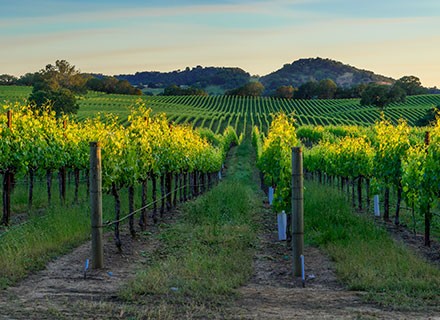In 1850, Captain Joseph W. Osborne settled in California. The following year, he decided to purchase a tract of land sprawling fifty acres south of Yountville and christened the place Oak Knoll: the most antiquated grape growing area of Napa Valley. He was the first to introduce vine cuttings of the superior European grape varieties in the state. But some say, George Calvert Yount, who was the first Euro-American permanent settler in the county willed the first plantings in Napa. It is as yet unclear whether Osborne or Yount should be granted the legacy of founding the Napa tradition.
But referring to the writings of historian Charles Sullivan: “Had he [Osborne] not been murdered by a former employee in 1863, history might well have named him the father of Napa Valley’s fine wine industry.” In fact, in 1856 Oak Knoll was titled the state’s best by the California Agricultural Society. Osborne along with Agoston Haraszthy, who is often referred to as Father of Modern Winemaking in California, formed the Sonoma-Napa Horticultural Society. However, Napa is just one of the many vineyards that contribute to California’s wine grape harvest: nearly about 4%, which represent 0.4% of the world’s wine population, observed Napa Valley American Viticultural Area AVA.
 Inspired by Napa, modern-day ‘America loves wine’: By numbers, its yearly sales are over $13 billion, observed the Trade Group Estimates. Yet. There seems to be an incompatibility in the country between fond wine drinkers and the ones that look for footing with the elite class.
Inspired by Napa, modern-day ‘America loves wine’: By numbers, its yearly sales are over $13 billion, observed the Trade Group Estimates. Yet. There seems to be an incompatibility in the country between fond wine drinkers and the ones that look for footing with the elite class.
Seven years ago, current President of the United States Donald Trump purchased Virginia’s Kluge Estate, in Albemarle County “because wine is incredibly sexy.” The 1300-acre property holding a vineyard, a winery and a wine inventory once belonged to the ex-wife of John Kluge, a German-American entrepreneur, who at the time was the richest person in America. His ex-wife Patricia Kluge was convinced that good wine can be made in Virginia. In the 1990s, she laid out a vineyard in the estate after receiving advice from Gabriele Rausse, and Michel Rolland, a profound winemaking consultant at the time. “Patricia was committed to making the best wine in the world,” said Rausse. “… I respect her for what she did for Virginia wine.” The Kluge Estate Winery and Vineyard sprawling 960 acres was established with a foresseable future to produce top-class wine. Today, the inclination toward the wine industry has proven to be a very lucrative fascination. By definition, it is somewhat a self-reward for mostly wealthy people who are gladly ignorant of the knowledge of vines a vintner must have in possession. The Trumps conquered the Kluge property in a manner that it “fell naturally into our acquisition strategy,” Eric Trump said. “We now own the biggest contiguous vineyard on the East Coast.”
It seems, there is a great deal of pride involved. Or for that matter, none of the Trumps appear much interested in the glory of vineyards, except that it’s emblematic of their gentry to have one in their possession.
Thanks to the modern evolution of vintner hood, the making of wine is no longer able to cherish the grape vine cultivation of the 50s…but has only become a striking version of viticulture. At the Trump Winery, nearly 20,000 cases of Trump Chardonnay rosé, Viognier, and more varieties are shipped yearly to 26 states and 4 countries, reported 2016 Wallace House.
It is important to be cognisant of the fact that the perception of the industry and passion for wine within the Trump family—or for the rich, in general, has become cosmetic as a result of them trying to embody a disillusioned understanding of the wine culture in America. “We own the finest golf courses and hotels in the world. Now wine’s part of that world,” Eric said. Trump still employs Kluge’s winemaker, Jonathan Wheeler. The estate was renamed as Trump Winery after the transfer of ownership. According to Eric, his father doesn’t drink: The buy is only because “It fits in with our company. It’s luxurious as well, particularly when combined with a grand house.”
In early 2013, the Winery applied for a special-use permit for an 18-hole golf course to be developed on the property. “All we have to do is cut the grass,” Eric jokes, meaning that his unapologetic views on the development of the property are aimed to ensure that “Trump properties have to be the best—clubs, hotels, houses. We pride ourselves on this.”
Nonetheless, the Albemarle County board of supervisors declined the application. So, in response, President Trump appealed directly to Virginia governor Terry McAuliffe. “After many acquisitions and tireless efforts,” he wrote, “I reassembled the estate, reopened the winery, and invested tens of millions of dollars, far surpassing the magnificent property’s former glory.” For many people, the move is jarring. It seems the Trumps’ persistence to have a golf course on the property amongst other developments signify a lot about their oblivious views on social discord—largely torn between commercial reasoning for development and agricultural sustainability—as James Conaway, author of Napa At Last Light: America’s Eden In An Age Of Calamity, describes in his essay: Rich People Are Ruining Wine. Conaway points out: there is always a “lifestyle vintner… a type of hobbyist investor who makes money in another field and then buys into wine, mostly for the social and financial cachet.” However, “Trump is but the most famous of them.”

